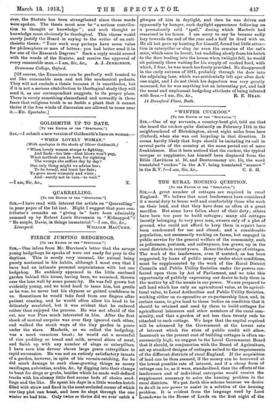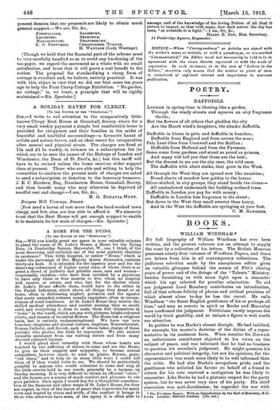THE RURAL HOUSING QUESTION. [To THE EDITOR Or THE "
SPECTAT06...1 SIR,—A great number of cottages are required in rural England. We believe that most landowners have considered it a moral duty to house well and comfortably those who work on their land, and that they have done so often it a great sacrifice. But some have fallen short of their duty; othera have been ter) poor to .build cottages ; many old cottages belonging to verypoor men, owners only of a Plot of ground, who could not afford to keep them in repair) have been condemned for use and closed ; and a considerable population, not necessarily working on farms, but engaged in public service for the general welfareof the -community, such as policemen, postmen, and railwaymen, has grown up in the rural districts in recent years. Hence the shortage of cottages. The work of the landowners, even if • assisted, as has been suggested, by loans of public money under strict conditions, must be supplemented by the work of the Rural District Councils and Public Utility Societies -under the powers con. ferred upon them by Act of Parliament, and we take this opportunity of publicly expressing our desire to help them in the matter by all the means in our power. We are 'prepared to sell land which has only an agricultural value, at its agricul- tural value, to Local Authorities and Public Utility Societies, working either on co-operative or ea-partnership lines, and, in certain cases, to give land to those bodies on condition that it should be retained and used by them to build cottages for agricultural labourers and other members of the rural com- munity, and that a garden of not less than twenty rods be attached to each cottage. We hope that the capital required will be advanced by the Government at the lowest rate of interest which the state of public credit will allow. Inasmuch as the present cost of building cottages is often un- necessarily high, we suggest to the Local Government Board that it should, in conjunction with the Board of Agriculture, set up standard designs of cottages suited to the requirements of the different districts of rural England. If the acquisition of land can be thus assured, if the money can be borrowed at the lowest possible rate of interest, and if a cheap form of cottage can be, as it were, standardized, then the efforts of the landowners and of individual enterprise would receive the supplement necessary to solve the housing problem in the rural. districts. We put forth this scheme because we desire to do all in our power to assist in • a solution of the housing problem. It is evident from the language used by Lord Lansdowne in the House Of Lords on the first night of the present Session that our proposals are likely to obtain much general support.—We are, Sir, &c., FrrsWILLIAM, SALISBURY, LEICESTER, SZLBORN X, MA R LBOROUGH, SHAFTESBURY, E. G. PRETY MAN, CHRISTOPHER TURNOR, IL WASTAGE (Lady Wantage).
[Though we hold that the financial part of the scheme must be very carefully handled so as to avoid any burdening of the tax-payer, we regard the movement as a whole with no small satisfaction, and trust that it will prove a real benefit to the nation. The proposal for standardizing a cheap form of cottage is excellent and, we believe, entirely practical. It was with this object in view that we did our best some ten years ago to help the First Cheap Cottage Exhibition. "No garden,
no cottage," ia, we trust, a principle that will be rigidly ru a intained.—E D. Spectator.]















































 Previous page
Previous page